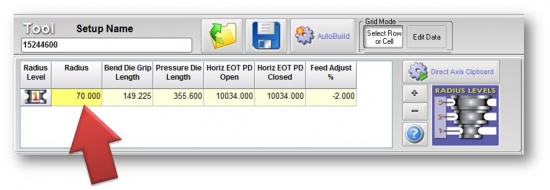Difference between revisions of "Feed Axis Faults During Feed Bending"
| Line 1: | Line 1: | ||
During Feed-Bending it is possible to experience a Feed Axis Fault that is most often caused by one of two issues: | During Feed-Bending it is possible to experience a Feed Axis Fault that is most often caused by one of two issues: | ||
<br><br> | <br><br> | ||
| + | |||
| + | Here are two indicators that will help you get to a resolution quickly: | ||
| + | * If the Feed Axis faults especially on large angle bends, then one or both of these are probably an issue. | ||
| + | * If the Feed Axis does NOT fault for the same part shape while bending with no part in the machine. | ||
| + | <br><br> | ||
| + | |||
<table> | <table> | ||
| Line 27: | Line 33: | ||
This value compensates for elongation during Feed-Bending. It is a negative integer value that indicates how much carriage travel to remove from the motion. | This value compensates for elongation during Feed-Bending. It is a negative integer value that indicates how much carriage travel to remove from the motion. | ||
<br><br> | <br><br> | ||
| − | Here's an | + | Here's an example: |
*8.147" of calculated feed motion for 155.6 degrees of bend | *8.147" of calculated feed motion for 155.6 degrees of bend | ||
| Line 40: | Line 46: | ||
</tr> | </tr> | ||
</table> | </table> | ||
| − | |||
| − | |||
| − | |||
| − | |||
| − | |||
| − | |||
Revision as of 20:46, 15 July 2009
During Feed-Bending it is possible to experience a Feed Axis Fault that is most often caused by one of two issues:
Here are two indicators that will help you get to a resolution quickly:
- If the Feed Axis faults especially on large angle bends, then one or both of these are probably an issue.
- If the Feed Axis does NOT fault for the same part shape while bending with no part in the machine.
|
TOOL PAGE
|
|
TOOL PAGE
That calculates to -14% elongation |
